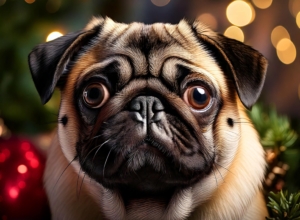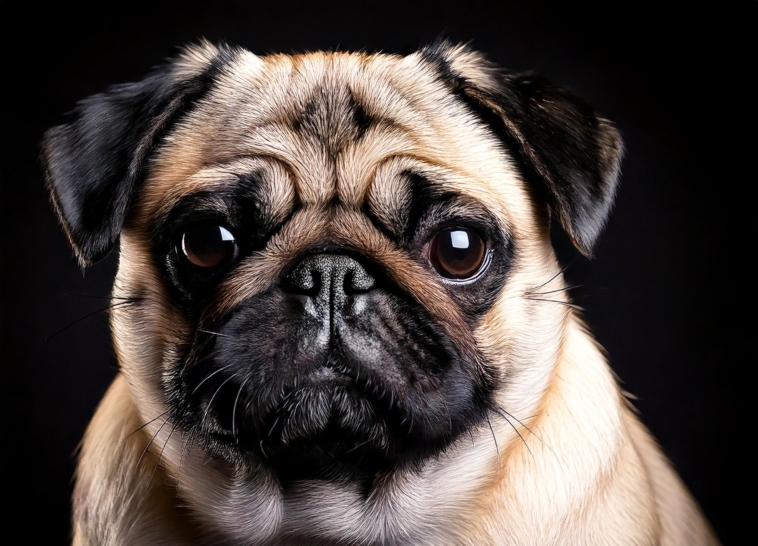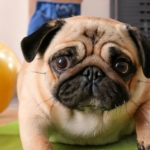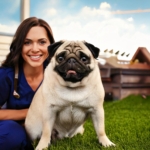Pugs: The Wrinkled Royalty of Dogdom
Let’s talk Pugs. You’ve seen them, heard them snort. You’ve watched them wiggle their curly tails like they just don’t care. These short-nosed charmers are basically ancient royalty trapped in the body of a squishy-faced loaf. Welcome to the world of Pugs — where the sass is high, and the legs are short.
Meet the Pug: Wrinkles, Wiggles & World Domination
Pugs didn’t amble into our lives lately — they paraded in from ancient China like the mini-emperors they are.
- Appearance: Short and square-built, with a 50/50 mix of wrinkles and eye contact on the face.
- Personality: Half clown, half cuddler. Stubborn, snuggly, and uncannily skilled at guilt-tripping.
- Size: Small and convenient. Imagine 10–13 inches in height, 14–18 pounds of drama.
- Life Span: 12–15 years of being the dictator of your home.
Pugs are not just pets — they’re lifestyle icons with a love for naps, snacks, and admiration.
Historical Highlights: Pugs Were Royalty Before It Was Cool
Long before they were meme material, Pugs were lounging in Chinese palaces, living their best lives, in the Han Dynasty (206 BC – 220 AD). Yes, your Pug’s ancestors were basically the Kardashians of ancient China.
- Royal Pets: Spoiled by emperors who thought a dog needed to be worshipped (your Pug would definitely concur).
- Monk Buddies: Tibetan monks housed them for tranquility and cuddles.
- European Conquest: They were taken to Europe by Dutch merchants who made them the It Dogs of Italy, France, and Holland.
- Victorian Celebrities: In the 1800s, Pugs had reached European upper society in full.
In short: They’ve always known they were a big deal.
Pug Anatomy 101: Cute by Design
Ever gazed upon a Pug and had the thought, “This dog was made by a toddler with playdough.” You’re not off base, but somehow it just works.
- Size: Smol.
- Face: Flat. Wrinkly. Judgy.
- Eyes: Large enough to dominate any staring competition.
- Coat: Short and sleek and available in colors such as fawn, black, silver, and “please get off my black pants.”
- Tail: Curly — preferably a double curl. Less and your Pug may require therapy.
- Ears: Button or rose-shaped and always on hand to pretend they didn’t hear you utter the word “bath.”
Pug Personality: Snorty Little Socialites
Pugs are living proof good things do come in snorty, wiggly packages.
- Clingy Cuties: They’ll track you to the bathroom and glare at your soul.
- Family Favorites: Children, cats, strangers — they adore everybody. Extroverts in fur.
- Chill Vibes: Fairly tolerant unless you’re out of treats.
- Goofy, But Loyal: They’ll have you in stitches sitting on your clean clothes like a miniature dictator.
Note: Leave them alone too long, and they’ll degenerate into a tragic opera of loneliness.
Health Drama: Beauty Comes at a Price
Pugs can seem like cuddly plush toys come to life, but behind the snorts and grins is a list of potential ailments.
- Snore City: That pushed-in face translates to Brachycephalic Syndrome — fancy terminology for “grandpa-like breathing with a cold.”
- Hip Drama: Hi, hip dysplasia — since waddling isn’t always adorable.
- Snack Freak: Pugs are too food-obsessed. Obesity exists. Hide the snacks.
- Eye Drama: With planet eyes, it’s no wonder they develop ulcers, infections, and “my eye is leaking why?.?.?.?.
- Skin Stuff: All those cute wrinkles? Just beggin’ for fungus and rashes. Time for regular wipe-downs.
Keep them clean, fit, and regularly vetted — and your Pug will return the favor with snores and everlasting devotion.

Grooming: Pamper That Pug
Pugs don’t require spa days à la carte — they just require regular upkeep to maintain diva status.
- Brushing: Short coat, but HEAPS of shedding. Brush weekly to prevent you from resembling a fur-covered sofa.
- Bathing: 3-4 weeks. Use gentle shampoo or face the Stinkpocalypse.
- Wrinkle Wipes: Daily wiping down between wrinkles. Seriously. Those folds are bacteria hotels.
- Teeth: Brush 2–3 times a week or buy dental chews. No one wants dragon breath.
- Nails: Trim once a month, or they’ll click-clack through the house like little tap dancers.
- Ears: Clean once a week. If they smell like a chemistry experiment, call the vet.
Feeding a Pug: It’s a Delicate Balance
Pug feeding is as much about negotiating with a furry food troll as it is about nutrition.
- Diet: High-quality dog food with the proper balance of protein, fat, and carbs.
- Portion Control: Their stomachs shout “more,” but their waistlines cry “please stop.”
- Meal Schedule: 2–3 meals a day. Avoids gorging and begging.
- Avoid: Human food (especially chocolate, onions, grapes), greasy foods, and excessive treats.
- Treats: Reserve them for training, not as a bribe to remain silent in front of the microwave.
Training Pugs: Treats, Praise, and an Unshakable Will
Pug training is very similar to negotiating with a toddler in an explosives-filled trench coat.
- Employ Treats: They have their best ears when snacks are present.
- Keep it BRIEF: 10–15 minutes max before the brain starts to check out.
- Employ Positive Vibes: Screaming is equivalent to immediate emotional meltdown (for both parties).
- Social Skills: Show them humans, other dogs, and the universe. The sooner, the better.
- Classes Assistance: Obedience school is fantastic for structure (and flaunting your clever potato).
Exercise: Yes, Even Couch Potatoes Need Cardio
Pugs are not athlete types — more for their skill at napping upright. But they do require exercise.
- Daily Walks: 15–20 minutes, morning and evening.
- Indoor Play: Toys, games, and soft tug-of-war get them active.
- Watch the Heat: Pugs heat up quicker than your phone in the sunshine. Walk in cooler periods.
- Mental Stimulation: Puzzle toys and simple training keep their mechanisms functioning.
Living With a Pug: Adjust Your Life Accordingly
So you’ve welcomed a Pug into your home. Congrats! Prepare for:
- Climate Control: Keep the AC on. Pugs are anti-heat.
- Furniture Takeover: Your bed? Their bed. Your couch? Also theirs.
- Weight Watching: Don’t let them sneak extra meals from grandma.
- Routine Vet Visits: Early detection = happy snorts.
- Low Jumps Only: No high furniture parkour — their bones can’t take it.
Thinking of Getting a Pug? Let’s Talk Adoption
Before purchasing, think about adopting one of these cute misfits.
- Breeders: Use the good guys. Search for health clearances and honesty.
- Adoption Centers: The shelters usually have Pugs waiting for love (and a snorer to share a bed with).
- Prices: Breeder rates are $600–$1500. Adoption rates are $100–$400.
- Pug-Proof Your Home: Chill temperatures, plush beds, and an unlimited supply of lint rollers.
Pug Accessories & Must-Haves
You don’t require a diamond collar, but some things are essentials.
- Harnesses: Next best to collars for their sensitive necks.
- Cooling Mats: They warm up quicker than pizza in a microwave.
- Elevated Bowls: Avoid neck strain and indigestion.
- Puzzle Toys: Brains get tired too.
- Chew Toys: Especially during the “I chew everything” stage.
- Comfy Beds: Ideally beside yours.
Traveling With Your Pug: Adventure, But With Naps
Yes, you can bring your snorty pal on adventures, but be ready:
- Vet Clearance: Vaccinations are a must.
- Carrier Life: A well-ventilated, comfortable travel carrier is a must.
- Water Supply: A travel bowl is a must — staying hydrated is important.
- Breaks: Pull over frequently for potty breaks and sniff breaks.
- ID Tags: And microchip as well — in case your little wanderer gets into something.
- Comfort Items: Blankets, calming sprays, or even their favorite toy will do the trick.
Fun Pug Facts: Impress Friends at Parties
- Ancient Heritage: More than 2,000 years of snuffles and snores.
- Wrinkle Royalty: Their facial wrinkles are said to spell out the Chinese character for “prince.”
- Tail Tamara: A double curl is the ultimate Pug tail holy grail.
- Nap Masters: They can sleep through anything. Including you uttering “walk.”.
Final Thoughts: Life With a Pug
To have a Pug is to have a tiny, imperial, snorting court jester by your side. They are adorable, needy, humorous, and full of personality. And yes, there are the health quirks and the shedding of a small grizzly bear — but in return, you get 24/7 love, humor, and a face that declares, “You will never refuse me. Ever.”




